 |
 MARY ROBINSON JACK JONES JACK ROBINSON |
|||
|
Name: Mary Robinson
Age: Deceased in 1968 Occupation during 1939: Housewife and mother. Mary Robinson’s describes in her letter, the fire that took the lives of her four children Mary, Theresa, Paul and Vera. Age at time of fire: 40 Location of interview: Colac – received Mary’s letter from her daughter Gloria Robinson "With flames over our heads, we felt death pass between us. Cold and remorseless, it struck our hearts with an icy chill." The fires had been burning for weeks around us, but we always had the thought that rain would come and they would go out, like every other year. But the 13th of Jan was different - hot north winds and oppressive heat were felt early in the day. We arose about seven o'clock. The children being on holidays, we did not hurry. After breakfast we said our prayers and each one had a task to do. My family were Dorothy, away from home working, John, Teresa, Mary, Vera, Paul, Jim and Tom, Gloria was the baby; all at home, ages ranging from 18 years to seven months. My husband and eldest boy started work about two chains from the house. They were woodcutters. My two girls went down to the well to wash any soiled clothes and the younger ones stayed about the house. A curious thing happened before the 13th. I used to go to the end of the road to get a lift into town for groceries and on this particular day, while waiting with one of my girls, a black greyhound came up to us. I knew it was a good dog, not like the ordinary mongrel you see about the bush. It had a new collar and had been well cared for. I said to Teresa, we will try and get it home, as we can do with a good dog. I looked at its collar, no name, so I thought it had fallen off a car going past to the Gellibrand River, as people from the city used to come to fish there. We got it home and it took onto us and we thought it was the wisest dog ever. "I shouted, "Run for your lives", thinking they would make the top of the road, and that we were doomed, but it was not so." A few days before the 13th it did act queer. It ran up to me and looked up with its big eyes and then ran off a little way and cried. Then up again, time and again it did this. I knew it was not hungry as we killed a sheep every week, but I knew that it was trying to tell me something. I told my husband and he could not understand it, but one night shortly before the 13th it started to howl and it was terrible. It was a death cry. My husband was going to shoot it but it stopped and cried no more. On the morning of that fateful day, my husband and son came home and my husband says, “It looks bad all around”. We had no wireless to tell us about the fire or which direction it was coming from. My husband sent one of the younger ones down to the well to bring up the girls from the washing, in case they were caught if the fire came. They came up and had a drink of milk, as it was too hot to light the fire. We had two cows and about 10 sheep, with about five acres cleared. "My shoes were burned off my feet and I never felt them. My husband battled to keep the other boys down, and his clothes were on fire time and again." About 11 the smoke and heat were worse but still we did not believe there was any danger. We were all together about 10 minutes to 12 when the fire struck the house. I lifted the baby and as we tried to force the back door, with flames over our heads, we felt death pass between us. Cold and remorseless, it struck our hearts with an icy chill. All this happened in seconds. We made for the front garden. I shouted, “Run for your lives”, thinking they would make the top of the road, about a chain, and that we were doomed, but it was not so. We lay for hours below the terrible heat of the burning house and hot iron, red hot, missing us by inches. I held the baby down to the earth and her eyes and ears were filled with dust and then she went unconscious. My shoes were burned off my feet and I never felt them. My husband battled to keep the other boys down in case they panicked, and his clothes were on fire time and again and still he kept telling us, under the noise of the fire, that we would get out of it. But what of our four lambs, where were they? I said among the fire (if our four children were dead), I never would believe God again or have faith in him but believe it or not I knew Christ lived and I could not deny him. "But what of our four lambs, where were they? I said among the fire (if our four children were dead), I never would believe God again" The roos, rabbits and birds all came around us to die. The kangaroos' necks were all swollen. They must have choked with the heat, but we lived at a terrible cost. We lay down on the ground about three hours and all of us had the terrible thought - what of the kiddies? We all had to lie down and my husband made me promise I would still stay where we were until Jack and he crawled up on their knees to the road. The bush was red hot. They called and called, but no answer, and then he found them lying side by side, Paul and Mary - the mates, they used to call themselves - and Vera and Teresa, no marks, just like they were asleep. It was too terrible for my husband. He crawled back and I knew I would see them no more. My husband, after making me promise to sit where I was, crawled to look for water with Jack, my son. The fire had destroyed all the tracks. He was a long time finding the well because everything was so strange, but he got water and it was hot - the well away down in the earth was boiling. The baby and the young boys sucked the dirty water, but I was too far gone with grief to feel thirsty and my husband never touched it, we were past feeling. There was about four miles to get out onto the main road through burning sand and falling trees. My husband covered up the bodies of our darlings with an old burned coat we had. He walked in front to see if it was safe and then came back for us. I had no shoes on and the heat of the ground was torture. It took us hours to get out - I knew as I looked at the houses standing that we were the unlucky ones. It was like a nightmare. "Then he found them lying side by side, Paul and Mary - the mates, they used to call themselves - and Vera and Teresa, no marks, just like they were asleep." The terrible sorrow; I wished I could die and that I had some awful disease, that my time would be short. My husband kept falling backward, but God must have had pity on us or else we would have lost our reason, and day by day we lived. And the people around us were very good and kind, they brought us clothes, food and money, and poor old pensioners offered us their pension. People came and talked to us, but to talk about the fire was torture. I wanted to hide and die in the bush and again I wanted to walk and walk with terrible thoughts we had. But faith in God slowly returned and brought with it a great peace, and we lived again but life was different. One gentleman in Melbourne wrote to us when he heard of our terrible loss and asked us to let him know what I would like. I did not want anything but he wrote again and again. I said to my husband, “We will ask for wreaths for their graves”, but he said, “Don't ask for that, ask for an old sewing machine”. I did and Mr Bishop of Melbourne sent the most beautiful Bluebird Sewing Machine. I thought how great a man he must have been and how he felt for us in our sorrow. But I must not forget the many friends near and far who sent us gifts, and how their kindness helped us through. The kiddies of the different schools subscribed money to put up a nice headstone. The baby and the young boys sucked the dirty water, but I was too far gone with grief to feel thirsty and my husband never touched it, we were past feeling. My husband covered up the bodies of our darlings with an old burned coat we had. Shortly after the fire, my husband wandered down to the well and sat down in sorrow, when he noticed a very large tiger snake lying beside him. It never attempted to fight but just crawled into a hole beside the well. He said afterwards it must have known he was in sorrow, as he felt no fear of it. I often think of the greyhound – Nigger, we called him – and how he tried to tell us and warn of the terrible tragedy of four young lives. How wise he was and how he loved the kiddies. They used to Cooee and he always answered them. I have no doubt he was doing his best to warn us to get out, but where he got his knowledge from I do not know. We found him after the fire under one of the burned beds on the verandah, burned to ashes. But if we had known what he was trying to tell us I would not be writing this tragedy. As about four miles further on, houses and people were all safe. We returned back to the bush and built a concrete house with money from the Fire Relief, but after seven years there it was too much and we left it to live three miles nearer a town. But we are still in the same district. All the boys soon returned to health and the baby, after a good wash and sleep, was soon her little self again. But we believe God's way is best, and that we will be united with our Loved Ones in a happier sphere. M.E. Robinson Read more about the Relief Fund established for survivors in 1939 in the Newspaper section |
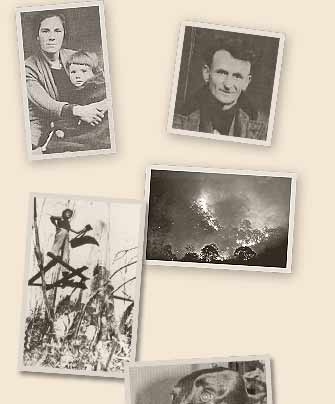 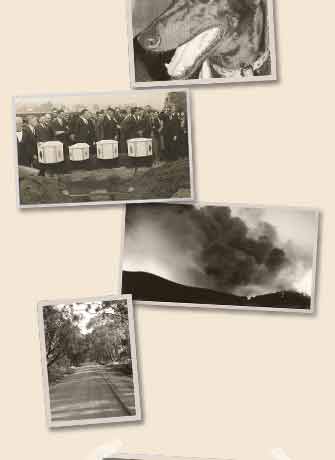 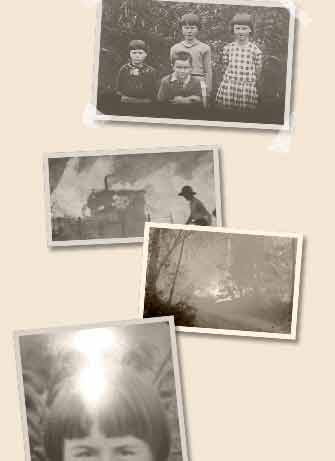 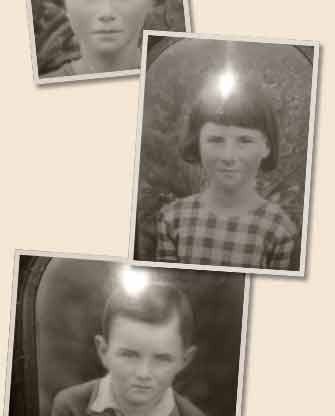 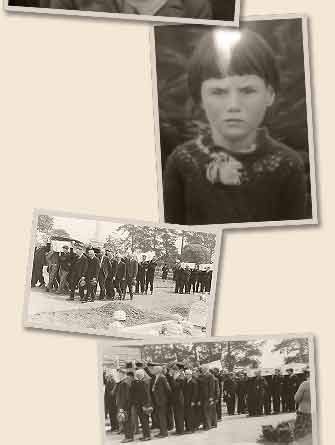 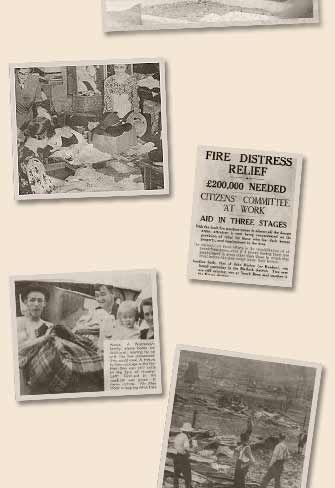 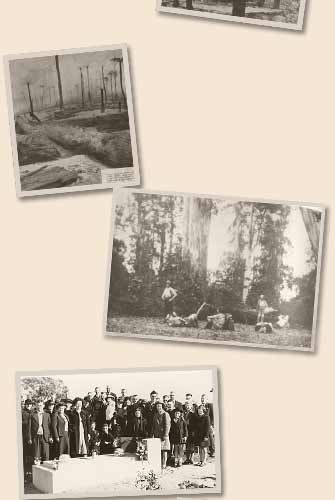 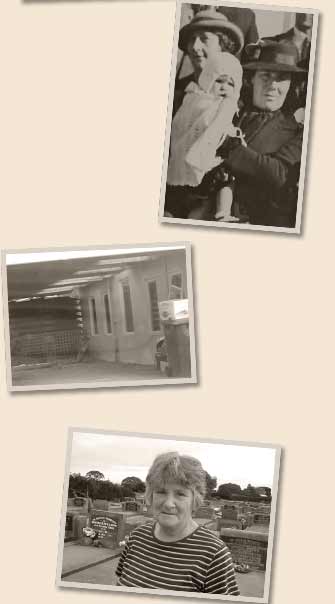 |
||
 |